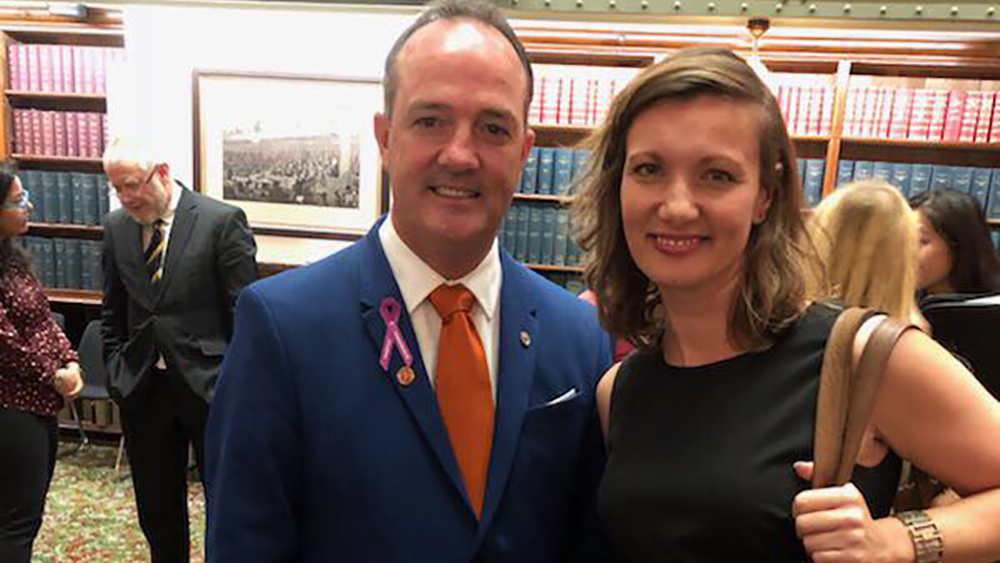4000 slaves in Australia mean we have work to do
First “Modern Slavery” Bill introduced into parliament
There are an estimated 4000 people in Australia enduring slavery or slave-like conditions, and 48 million slaves around the world. That’s why a “Modern Slavery Bill” was introduced today into the NSW Parliament by Christian Democrat Paul Green.
The NSW Parliament is sometimes called the “bear pit” because it is so rowdy, but there was a respectful silence as Green introduced his bill – unlike other bills on the same day. It’s not every day either that an Archbishop sits in the chamber, but Sydney Anglicans’ Glenn Davies was there representing all the Christian leaders who back the bill. And it’s not common for a minor party member to have the support of the Premier Gladys Berejiklian and the leader of the Opposition Luke Foley to get the measure through.
“We have all unintentionally benefited from modern slavery in the clothes we wear and what we eat.” – Paul Green
“Human trafficking is a modern form of slavery. It is a transnational crime that preys on society’s most vulnerable,” Mr Green said.
Human trafficking includes slavery and slave-like practices such as servitude, forced labour, debt bondage, organ trafficking, deceptive recruiting as well as forced marriage and childhood brides.
Green pointed out that all of these reach into Australia. “The Daily Telegraph recently reported that girls as young as 12 are being pimped out in western Sydney, recruited on Facebook. Organ trafficking sees prisoners shot on demand.” He pointed to a report by The Australian‘s Amanda Hodge that Australian pedophiles pay a tiny sum “to watch children being abused and tortured overseas.”
A key part of the Modern Slavery Bill will see the appointment of an Anti-Slavery Commissioner. The commissioner will work with investigative agencies and have an educational role but crucially will monitor business supply chains. “We have all unintentionally benefited from modern slavery in the clothes we wear and what we eat,” explained Green.
If the bill gets through, organisations with more than $50 million turnover will have to publish an annual modern slavery report.
“This [bill] is vital to the protection of children here in NSW and in our region.” – Caroly Houmes
The bill will also introduce requirements around slave-proofing supply lines, establishing a victim-centred approach to this crime, and strengthening laws with regard to cybersex trafficking.
“The Modern Slavery Bill sends a clear message to pedophiles seeking to abuse vulnerable children through live-streamed sexual abuse,” said Caroly Houmes, Chief Executive of International Justice Mission Australia.
“These amendments will make a critical difference in our capacity to effectively prosecute cybersex trafficking. This is vital to the protection of children here in NSW and in our region.”
Green also used the opportunity of introducing the bill to “acknowledge the many organisations and individuals that have worked tirelessly to raise awareness of this abhorrent crime. Today, their advocacy is bearing fruit.”
This bill is a product of the Inquiry into Human Trafficking in New South Wales, its findings and recommendations and the Modern Slavery Bill working group.
“I believe in doing everything I can to see this blight removed from our society. As William Wilberforce once said, ‘You may choose to look the other way but you can never say again that you did not know’,” shared Green, as he concluded his speech to unparliamentary applause.
“Such practices are a blight on our society.” – Glenn Davies
Sydney Anglican Archbishop Glenn Davies called upon the NSW Parliament and population to give “wholehearted support” to Green’s Modern Slavery Bill.
“Such practices are a blight on our society, as they were in the days of William Wilberforce, and I urge all people, especially Christians, to join the fight to eradicate slavery in all its forms,” said Archibishop Davies.


